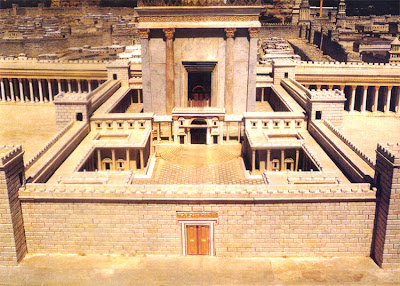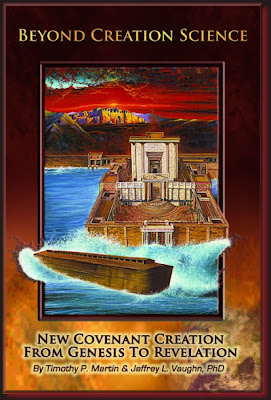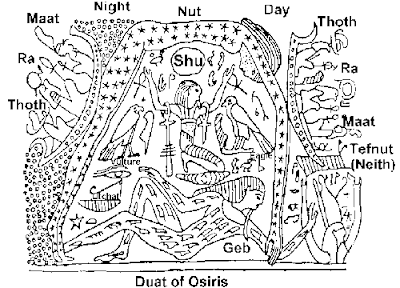 There is an outstanding discussion of Francis S. Collins’ The Language of God and its theological ramifications at Scot McKnight’s Jesus Creed blog. Check it out here!
There is an outstanding discussion of Francis S. Collins’ The Language of God and its theological ramifications at Scot McKnight’s Jesus Creed blog. Check it out here!
Category Archives: Uncategorized
Discussing “The Language of God” at Jesus Creed
Filed under Uncategorized
Help Me, Obi-Wan Kenobi!
Filed under Uncategorized
Comment on The Creation of an Evolutionist
Filed under Uncategorized
John Walton’s “Greatest Hits” — Part 3
 Part 1 of my John Walton’s “Greatest Hits” series can be read here.
Part 2 can be read here.
Day 3 — Creation of Land & Vegetation
Once again, what is being accomplished on Day 3 is the establishment of a function. Nothing of material structure is created, for ANE cultures were not concerned with such things. Just as God created the bases for time and weather on Days 1 & 2, God creates the basis for vegetation on Day 3. To ANE civilizations, time, weather, and vegetation were of prime importance to agricultural industry and intimately connected to each other. Like Genesis 1, the Babylonian creation epic, Enuma Elish, depicts their god Marduk establishing the functions of time, weather, and vegetation.
Part 1 of my John Walton’s “Greatest Hits” series can be read here.
Part 2 can be read here.
Day 3 — Creation of Land & Vegetation
Once again, what is being accomplished on Day 3 is the establishment of a function. Nothing of material structure is created, for ANE cultures were not concerned with such things. Just as God created the bases for time and weather on Days 1 & 2, God creates the basis for vegetation on Day 3. To ANE civilizations, time, weather, and vegetation were of prime importance to agricultural industry and intimately connected to each other. Like Genesis 1, the Babylonian creation epic, Enuma Elish, depicts their god Marduk establishing the functions of time, weather, and vegetation.
Walton then makes the interesting point that, after Noah’s flood, God promises that the three major life-giving functions would never cease: “While the earth remains, seedtime and harvest [vegetation/agriculture], cold and heat, summer and winter [weather], day and night [time], shall not cease” (Gen 8:22 ESV). And that’s an excellent promise, for the importance of these three functions is just as important today as it was in millennia past.
Establishment of Monotheism In non-Hebrew cultures, the governance of time, weather, and agriculture—the “foundations of the cosmos”—were attributed to a pantheon of gods. The destinies of men were also tied to the whims of the gods. One of the most important aspects of the Genesis creation account is the proclamation that God (Elohim) ruled the cosmos. In effect, Genesis did away with the common misconception that deities were behind the forces of nature, and that Elohim was in full control.The Cosmic Temple
Also of note is the concept that the cosmos, the fabric of which was “created” on Days 1-3, serves as God’s temple (cf. Isa 66:1-2a; Acts 7:48-50; Ps 104:2-4). ANE parallels to this cosmic temple idea established in Genesis 1 abound, e.g., the Mesopotamian temple dedication texts written by Gudea (ca. 1900 BC) and Egyptian temple texts. Note also the parallels between the description of Eden (Gen 2:10), the Ezekiel temple (47:1-12), and the temple in Revelation (22:1-3). To further the cosmos/temple argument is the priestly terminology in Gen 2:15 used to describe man’s function in the garden of Eden, which is considered “sacred space” and represents a microcosm of God’s cosmic temple. Divine control, argues Walton, radiates from His temple. God’s presence dwells in His temple. If you’re not convinced yet that Genesis 1 is a “temple text” …T
ransitioning to Days 4-6 and the Establishment of “Functionaries” It might interest you that ANE temples were commonly dedicated over a period of SEVEN DAYS! While Days 1-3 were concerned with the declaration, or establishment, of functions and the “fabric of the cosmos,” Days 4-6 were concerned with the installation, or establishment, of functionaries. Thus, the sun and moon, animals, and mankind were “created” to serve in the capacities to which they were designed, assigned, and destined.Day 7 – God’s Rest
Like other ANE gods, Elohim is said to “rest” on Day 7, connoting “stability” and “equilibrium.” All is functional, all is good (except for man’s loneliness, which represents a “non-function”). Genesis 1, then, is indeed a “temple text,” just like the Ugaritic Baal Cycle and the Enuma Elish.Conclusion
Genesis 1, read at face value (dare I say “literally”), is NOT about God making things. God inspired the author of Genesis to write about God establishing function and purpose, creating order from chaos, declaring other “gods” to be persona non grata, and proclaiming that the cosmos is God’s, with heaven serving as His throne and earth serving as His footstool! Amen.Filed under Uncategorized
Whales and Bovines Genetically Related?!?! Inconceivable!
 I’m not sure whether this picture is genuine, but I think it could settle forever the entire whale/cow common descent debate.
I’m not sure whether this picture is genuine, but I think it could settle forever the entire whale/cow common descent debate.
Filed under Uncategorized
“Beyond Creation Science” Is Here!
 I spent the last week in Monterey, CA, scoping out the city in advance of our imminent move next month so that I can attend the Army’s Defense Language Institute for a year-long language training program in Farsi (Persian). It was agonizing in one respect: a special package was to arrive during my absence. Not being able to open that package right away and view the contents was like a kid going to bed the night before Christmas, wondering what part of his wish list he could line out in the morning. Inside the case were 24 copies of a book with which I was already intimately familiar. So why would it be agonizing? Because it marks the publication and release of the first major piece of literature that suffered the wrath of my “red pen.”
Authors Timothy Martin and Dr. Jeffrey Vaughn not only solicited my thoughts on the content, but they were also gracious enough to let me wreak havoc on the manuscript. Some may think editing a manuscript would be a tedious task, and in some cases that is entirely true. In others, of which Beyond Creation Science: New Covenant Creation from Genesis to Revelation is a prime example, it was a pleasure to edit. Because the information contained in this volume assisted greatly in my ultimate break from Young-Earth Creationism, it wasn’t just a job … it was an adventure! :::cue cool Kenny Loggins Top Gun music:::
What’s unique about this particular book is how it ties the creation debate with the “end times” debate. Although the authors and I don’t agree fully on the origins question (both are Old-Earth Creationists, whereas I’m an Evolutionary Creationist), or on the correct interpretation of the early chapters of Genesis, we both agree that OECs (or even ECs/TEs for that matter) who still hold to a futurist eschatology have failed to examine the major (theo)logical disparity between their view of beginnings and their view of the end. It is the addressing of this disparity that proves to be the strength of Beyond Creation Science. If you, as a reader of this blog, have already made that agonizing paradigm shift from YEC to OEC or TE/EC, yet still look to a future “new heavens and new earth,” then I highly recommend this book to you, along with Brian Martin’s Behind the Veil of Moses, the second edition of which I am currently editing.
Beyond Creation Science is available for purchase right now from http://www.beyondcreationscience.com! What are you waiting for? (Or is that, “For what are you waiting?”) 😉
I spent the last week in Monterey, CA, scoping out the city in advance of our imminent move next month so that I can attend the Army’s Defense Language Institute for a year-long language training program in Farsi (Persian). It was agonizing in one respect: a special package was to arrive during my absence. Not being able to open that package right away and view the contents was like a kid going to bed the night before Christmas, wondering what part of his wish list he could line out in the morning. Inside the case were 24 copies of a book with which I was already intimately familiar. So why would it be agonizing? Because it marks the publication and release of the first major piece of literature that suffered the wrath of my “red pen.”
Authors Timothy Martin and Dr. Jeffrey Vaughn not only solicited my thoughts on the content, but they were also gracious enough to let me wreak havoc on the manuscript. Some may think editing a manuscript would be a tedious task, and in some cases that is entirely true. In others, of which Beyond Creation Science: New Covenant Creation from Genesis to Revelation is a prime example, it was a pleasure to edit. Because the information contained in this volume assisted greatly in my ultimate break from Young-Earth Creationism, it wasn’t just a job … it was an adventure! :::cue cool Kenny Loggins Top Gun music:::
What’s unique about this particular book is how it ties the creation debate with the “end times” debate. Although the authors and I don’t agree fully on the origins question (both are Old-Earth Creationists, whereas I’m an Evolutionary Creationist), or on the correct interpretation of the early chapters of Genesis, we both agree that OECs (or even ECs/TEs for that matter) who still hold to a futurist eschatology have failed to examine the major (theo)logical disparity between their view of beginnings and their view of the end. It is the addressing of this disparity that proves to be the strength of Beyond Creation Science. If you, as a reader of this blog, have already made that agonizing paradigm shift from YEC to OEC or TE/EC, yet still look to a future “new heavens and new earth,” then I highly recommend this book to you, along with Brian Martin’s Behind the Veil of Moses, the second edition of which I am currently editing.
Beyond Creation Science is available for purchase right now from http://www.beyondcreationscience.com! What are you waiting for? (Or is that, “For what are you waiting?”) 😉Filed under Uncategorized
God’s Continuous Creation
—E. C. Rust, Nature and Man in Biblical Thought [1953]
Filed under Uncategorized
John Walton’s “Greatest Hits” — Part 2
 Part 1 of my John Walton’s “Greatest Hits” series can be read here.
Part 1 of my John Walton’s “Greatest Hits” series can be read here.
Filed under Uncategorized
“Le bon Dieu est dans le détail”
Another favorite illustration is the weather. While it may not be purely random (certain known processes are involved, such as temperature, pressure, humidity, etc.), actual weather events can be seen to encompass a good deal of randomness when we look at the detail level, even with modern instruments and observations. Chaos theory is now invoked to describe these random processes.
Is God involved in the weather? Does God jiggle every particle of dust through the atmosphere to create a rain drop to be flung to the ground at His will, or does move every electron in a spark of lightning? Common sense tells me no, these are natural processes that God doesn’t need to directly manipulate. Yet, does God occasionally bring hail storms as judgment against sin? Does he bring famine and drought, as predicted by the prophets, to humble his people and bring them to repentance? Is he able to bring the rain again after the people repent, due to the ministry of an Elijah?
I suspect if questioned, [some] would respond that these specific examples of God “directing” the otherwise natural and random processes of weather, are evidence of the NON-randomness of those particular events. But this is an ad hoc distinction. Looking from a neutral, scientific perspective, the events in question, though perhaps unlikely, would be part of the random distribution of possible weather patterns and indistinguishable from “non-directed” events. It is only by looking at those events with a theological perspective, knowing that in some cases there is a revealed “purpose” and intention behind them, that one can say they are non-random or directed. (And even then there is the question in many cases, did God cause the event, or did he simply infuse it with meaning through the message of the prophets or by the action of His Spirit working on human hearts, bringing them to repent of their ways?) In so doing, there has been introduced a completely different level of observation, and I suspect even a different definition of randomness when viewing the event from the perspective of “theological purpose” versus “physical process.”
So from this, I guess the biologist could look at the scientific evidence of evolution and observe many features resembling randomness, but the theologian looking at the same process could claim directedness and purposefulness in God’s action from a Theistic Evolutionary perspective. Is this a case, somewhat like in Special Relativity, where two different observers can both be correct from their own frame of reference, even though their observations differ from one another?
This is a valid question for Theistic Evolutionists—for those who defend “undirected” evolution as the mechanism of evolution, do you also hold the idea of purposefulness at a higher level? Is there any Theistic Evolutionist who doesn’t confess directedness and purposefulness behind evolution, when viewing it above the level of scientific and biological fact? Isn’t this the very meaning of the term “Theistic” Evolution? Evolution is the mechanism of the biological level, theism is the mechanism of a higher order.
I also like the illustration that has been given before, of the words “God is love” written on a blackboard. At one level, they are simply solid bits of chalk adhering to the board. At a lower level, they are not solid at all, but are mostly empty space consisting of random motions of electrons, protons and neutrons. At a higher level, it can be seen that there is a non-random design and intentionality in the pattern of chalk, provided one recognizes the language of English in which they are written. And at a yet higher level of cognitive and emotional awareness, the words “God is love” mean something more than the pattern of the letters reveals, and on the highest level is God’s love itself which incapable of being fully understood. Which one of these levels of perception is the “true” one—the random motion of electrons, the designed pattern of bits of chalk created by human hand, or the divine reality of God’s love that transcends mortal ability to comprehend? They are all true from different frames of reference.
Filed under Uncategorized
Tag! You’re It!
I’ve been “tagged” by ElShaddai Edwards at He Is Sufficient.
- What translation of the Bible do you like best? New English Translation (NET)
- Old or New Testament? New Testament
- Favorite Book of the Bible? John
- Favorite Chapter? Genesis 1
- Favorite Verse? Revelation 21:5a
- Bible character you think you’re most like? David … a “man after God’s own heart” (1 Sam 13:14) but with enough character flaws to offset things a bit
- One thing from the Bible that confuses you? The timing and length of the Millennium
- Moses or Paul? Paul
- A teaching from the Bible that you struggle with or don’t get? The tension between man’s freedom and God’s sovereignty. Odd struggle for me, especially as a Calvinist.
- Coolest name in the Bible? There were only two named angels: Michael and Gabriel. Guess which one I think is coolest?
I will now tag: Virgil Vaduva (Planet Preterist), Gordon J. Glover (Beyond the Firmament), and Tim Martin (Beyond Creation Science).
Comments Off on Tag! You’re It!
Filed under Uncategorized
